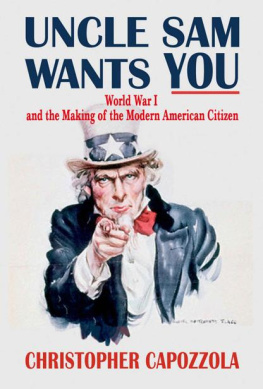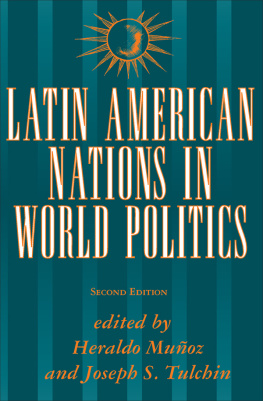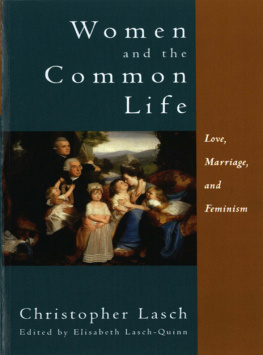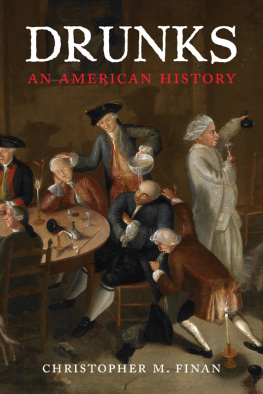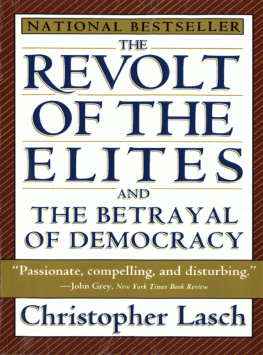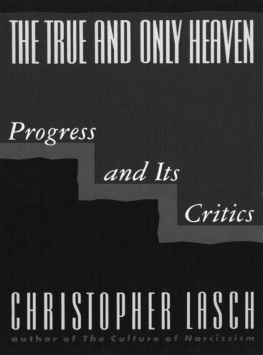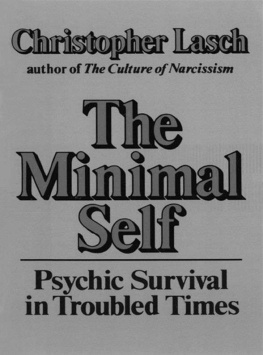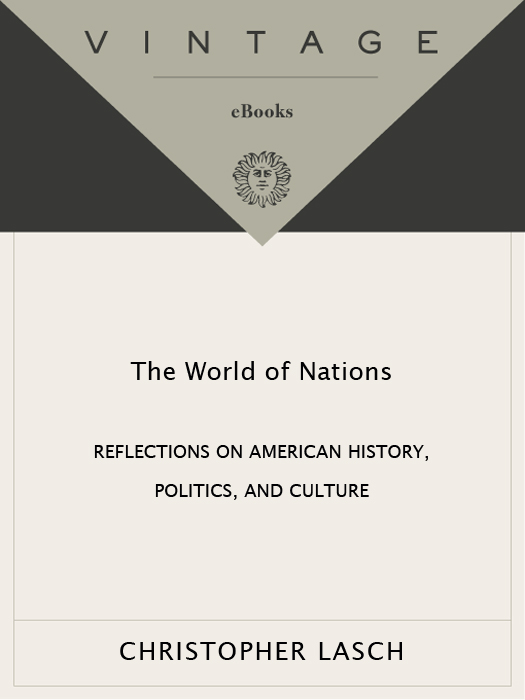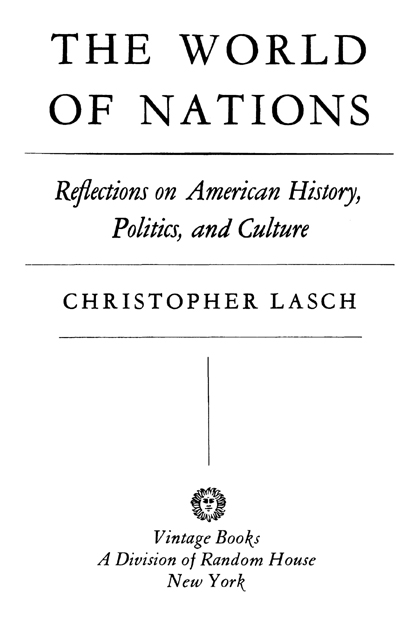FIRST VINTAGE BOOKS EDITION, March 1974
Copyright 1962, 1966, 1968, 1969, 1970, 1971, 1972 by Christopher Lasch
All rights reserved under International and Pan-American Copyright Conventions. Published in the United States by Random House, Inc., New York, and simultaneously in Canada by Random House of Canada Limited, Toronto. Originally published by Alfred A. Knopf, Inc., in 1973.
Library of Congress Cataloging in Publication Data
Lasch, Christopher.
The world of nations.
1. Social historyModern. I. Title.
[HN15.5.L37 1974] 309.I 04 7315926
eISBN: 978-0-307-83058-6
Portions of this book originally appeared in Atlantic Monthly, The Columbia Forum, The Nation, The New York Times, New York Review of Books, and Katallagete.
Grateful acknowledgment is made for permission to reprint the following material:
The Anti-Imperialists, the Philippines, and the Inequality of Man by Christopher Lasch, from Journal of Southern History, XXIV (August, 1958). Copyright 1958 by the Southern Historical Association. Reprinted by permission of the Managing Editor.
Excerpt from The New American Revolution by Roderick Aya and Norman Miller. Copyright 1971 by the Free Press, a division of the Macmillan Company. Reprinted by permission of the Macmillan Company.
The Gates of Eden by Christopher Lasch, from The Yale Law Journal, Vol. 80. Reprinted by permission of the Yale Law Journal Company and Fred B. Rothman & Company.
The Social Thought of Jacques Ellul by Christopher Lasch, from Introducing Jacques Ellul, by James Y. Holloway, published by William B. Eerdmans Publishing Co. Used by permission.
v3.1
TO CHRIS
But in the night of thick darkness enveloping the earliest antiquity, so remote from ourselves, there shines the never-failing light of a truth beyond all question: that the world of civil society has certainly been made by men, and that its principles are therefore to be found within the modifications of our own human mind. Whoever reflects on this cannot but marvel that the philosophers should have bent all their energies to the study of the world of nature, which, since God made it, He alone knows; and that they should have neglected the study of the world of nations or civil world, which, since men had made it, men could hope to know.
VICO
CONTENTS
Preface
SINCE THESE ESSAYS DEAL WITH A WIDE VARIETY OF SUBJECTS, ANY ATTEMPT to order them was bound to be somewhat arbitrary. The essays in the first section treat a number of themes in the social and cultural history of the nineteenth and early twentieth centuries, exploring, among other things, the strengths and weaknesses of traditional liberalism. A second series attempts to bring historical data and theory to the analysis of more contemporary issues, in particular to the claim of various kinds of radicalism to offer a convincing alternative to liberalism.
The essays in the last section deal more broadly with contemporary problems, again from a historical point of view. They attempt to analyze certain central aspects of advanced industrial societyneo-imperialism, the educational structure, the dominance of technologythat seem to me to be inadequately explained either by liberal or by radical traditions of social thought. Although I reject the contention that we live in a post-industrial society to which the older criticism of capitalism formulated by Marx and other nineteenth-century critics is now hopelessly irrelevant, it does appear to me that the rigidity of Marxism and of the socialist tradition generally has helped to create the theoretical vacuum such theories seek to fill. The weaknesses of a purely economic interpretation of American imperialism invite an interpretation of American foreign policy as post-imperial. The failure to come to grips with theoretical problems presented by modern technologythe ritualistic repetition of the tired old clich that what matters is the economic system, not technology itself (which is politically and ethically neutral)invites interpretations of the technological society in which visions of a technological apocalypse alternate with visions of technological utopia. The lefts failure to provide a satisfactory analysis of the modern educational system, of the university in particular, leaves unchallenged the idea that the emergence of the multiversity helps to define the transition from capitalism to post-industrial societyone of the alleged characteristics of the new order being the dominance of what Galbraith calls the scientific and technical estate. The essays in this last section eschew the crude determinism that so often passes for Marxism, while at the same time attempting to show the continuity between the nineteenth and twentieth centuries, between advanced industrial society and earlier forms of capitalism, and thus to refute the notion that contemporary life rests on new and unprecedented forms of social organization.
Disparate as they are in their subject matter, most of these essays, even the earliest in point of composition, reflect a long-standing antipathy to Whiggish or progressive interpretations of history. I have never found very convincing those explanations of history in which our present enlightenment is contrasted with the benighted conditions of the past; in which history is regarded as marching, with occasional setbacks and minor reverses, toward a better world; and in which moral issues appear unambiguous and reform and radical movements are seen as a straightforward response to oppressionoutpourings of humanitarian sympathy. There are some signs that this kind of historical sentimentalism may be coming back into fashion in the form of an attack on the conservative historiography of the 1950s, and it is therefore necessary to insist that a radical or socialist version of these enlightened prejudices, as Engels once called them, is no more acceptable than a liberal version. If these essays help to discourage a revival of historical progressivism, or even to put a few obstacles in the way of its triumph, they will have justified their publication in this form.
THE LIMITS
OF LIBERAL REFORM
[I]
Origins of the Asylum
I N THE OPENING PAGES OF The Princess Casamassima, Henry James records the visit of Amanda Pynsent and her young ward, Hyacinth Robinson, to the penitentiary in which Hyacinths mother lies dying. Jamess description of the prisonthat huge dark tombevokes an unforgettable impression of the early industrial age, the monuments of which still stand in the older sections of our cities: grim factories, crumbling fortress-like schools and reformatories, prisons and poorhouses, asylums of every kind, faceless and forbidding.
[T]hey saw it lift its dusky mass from the bank of the Thames, lying there and sprawling over the whole neighbourhood with brown, bare, windowless walls, ugly truncated pinnacles and a character unspeakably sad and stern. It looked very sinister and wicked, to Miss Pynsents eyes, and she wondered why a prison should have such an evil air if it was erected in the interest of justice and ordera builded protest, precisely, against vice and villainy. This particular penitentiary struck her as about as bad and wrong as those who were in it; it threw a blight on the face of day, making the river seem foul and poisonous and the opposite bank, with a protrusion of long-necked chimneys, unsightly gasometers and deposits of rubbish, wear the aspect of a region at whose expense the jail had been populated. As she hung back, murmuring vague ejaculations, at the very goal of her journey, an incident occurred which fanned all her scruples and reluctances into life again. The child suddenly jerked away his hand and, placing it behind him in the clutch of the other, said to her respectfully but resolutely, while he planted himself at a considerable distance:



